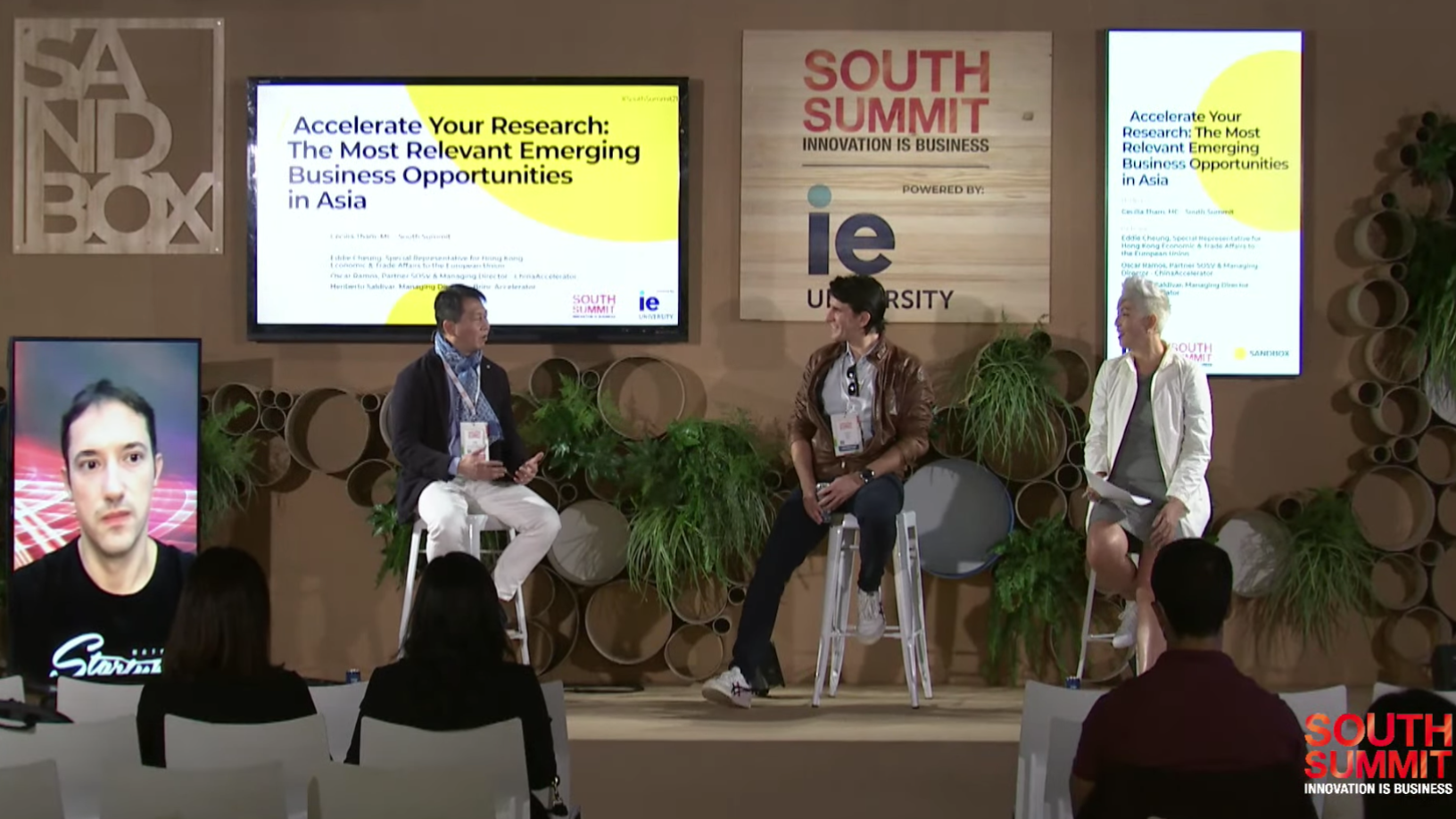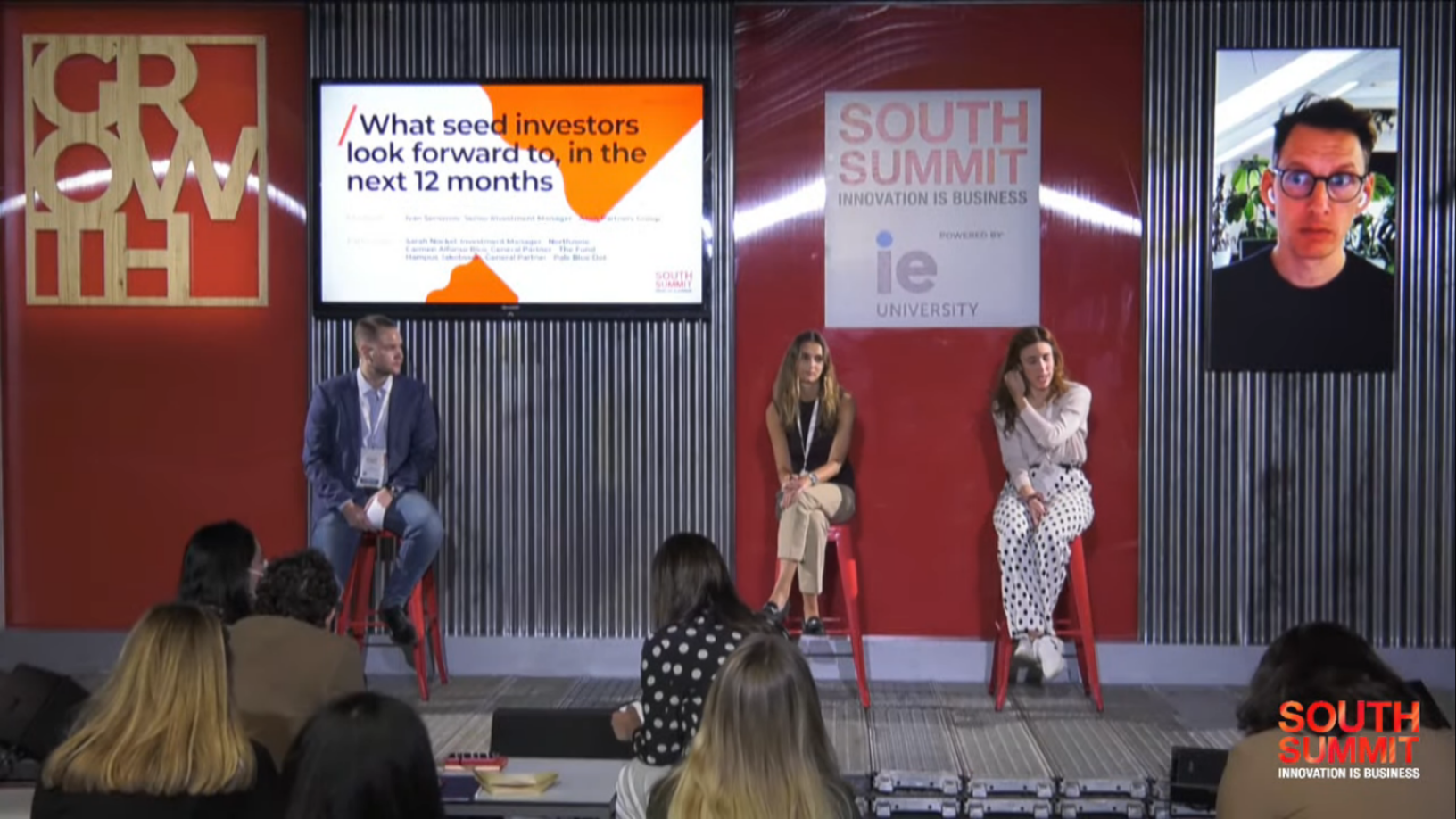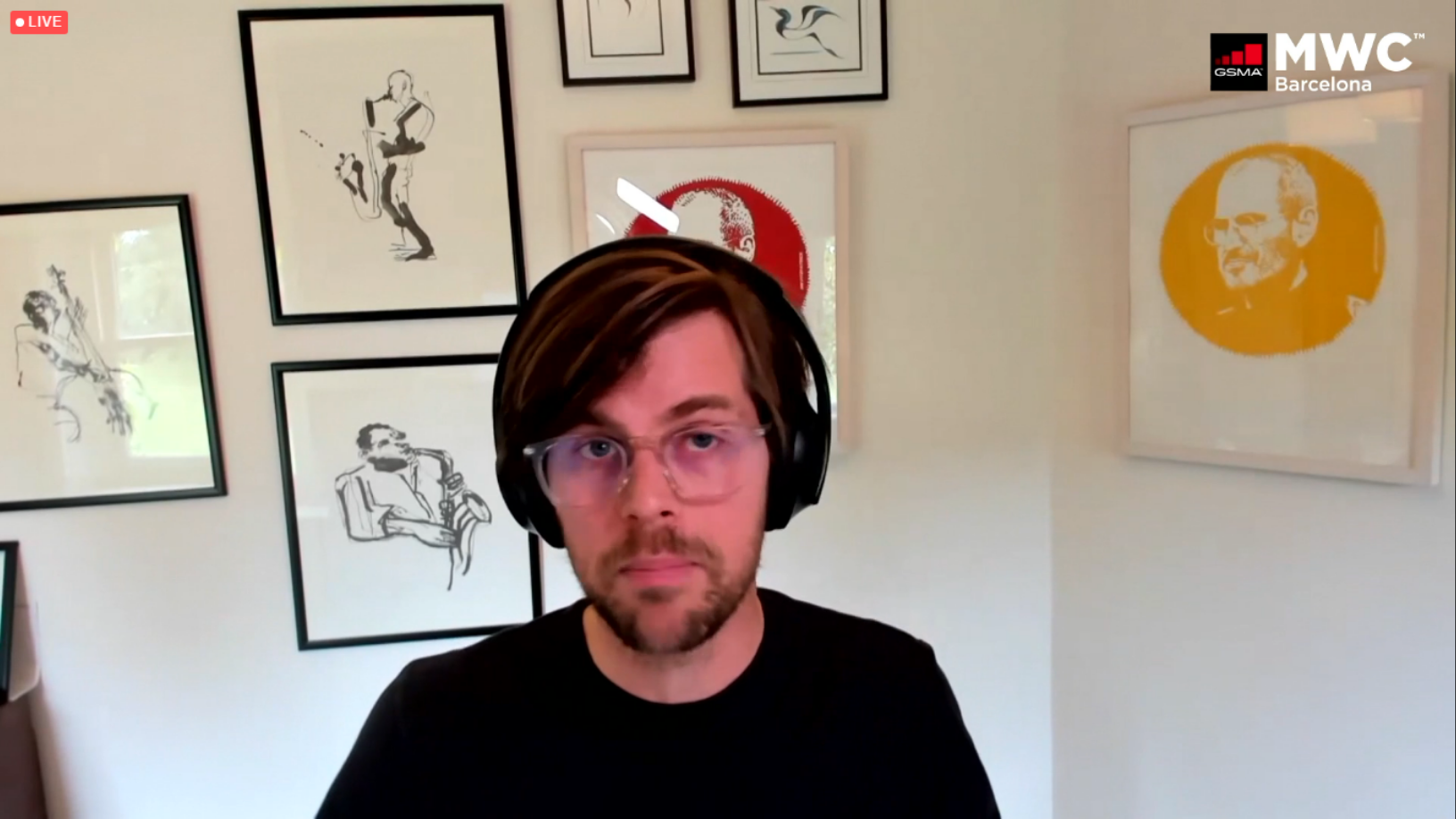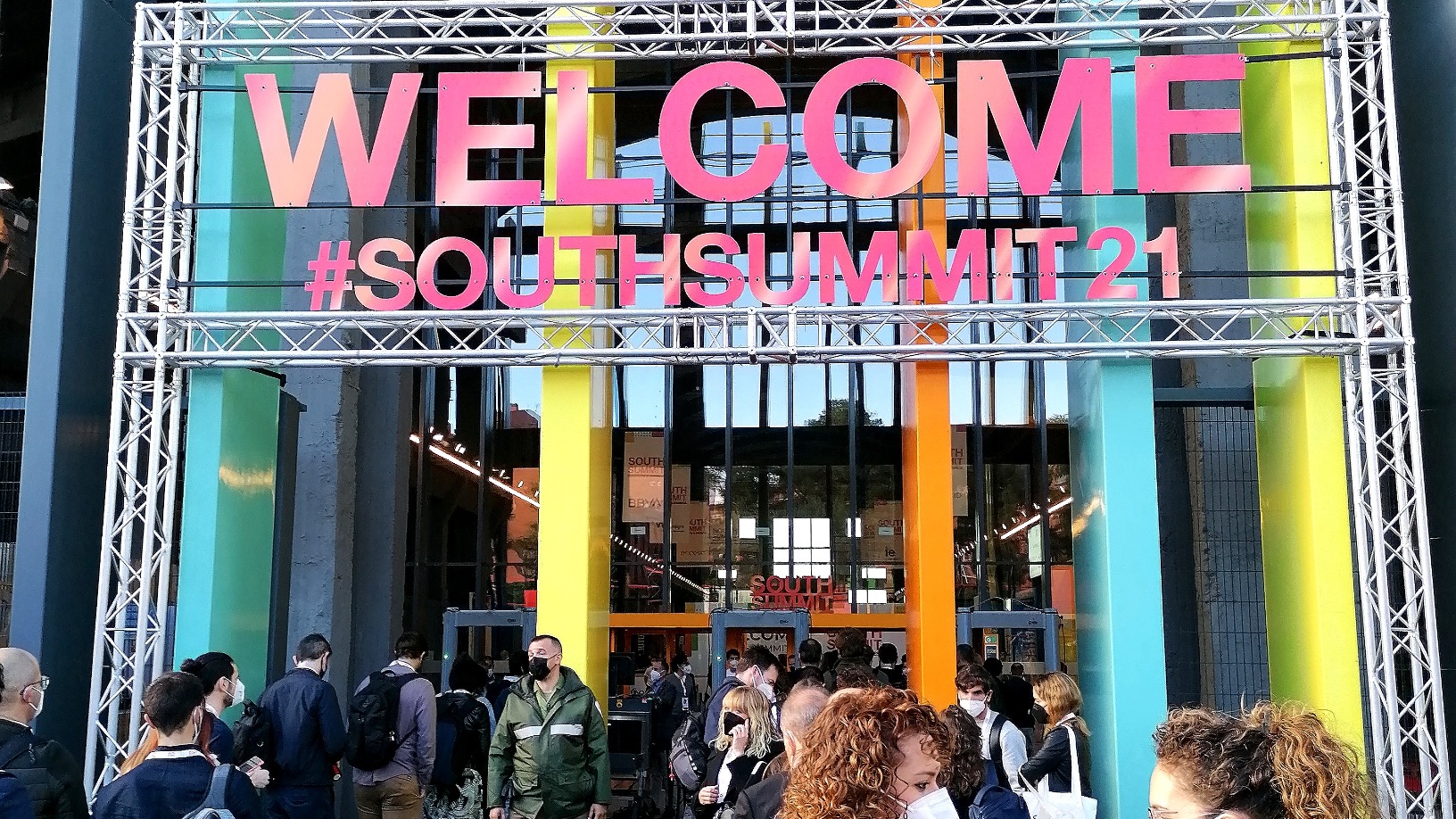At Spain's largest startup conference, South Summit 2021, a panel comprising China-based investors and a Hong Kong trade delegate offered insights and advice on expansion to the world's largest and most populous continent. On October 6, the panel, “Accelerate Your Research: The Most Relevant Emerging Business Opportunities in Asia,” covered key topics for startups seeking to expand to China, home to just under 60% of the world's population.
Moderated by Hong Kong-born entrepreneur and social innovator Cecilia Tham, the panel included three industry experts in the Asian ecosystem. Shanghai-based Spaniard Oscar Ramos is a partner at global investor SOSV that runs a China-based acceleration program; Mexican Heriberto Saldivar Massimi is Managing Director of Hong Kong-based IoT hardware-focused Brinc Accelerator; and Eddie Cheung is the Special Representative for Hong Kong Economic and Trade Affairs to the European Union.
The following Q&A panel discussion has been edited for length and clarity.
Cecilia Tham: What opportunities should entrepreneurs and startups from the West be aware of when considering doing business in China?
Eddie Cheung: Hong Kong is small, but it is a big international financial center. So when you are talking about opportunities, Hong Kong is the gateway to China. It is very easy to travel from Hong Kong to mainland China. Hong Kong is full of funding opportunities with venture capitalists, private equities and family offices.
In terms of partners, we have top universities like the Polytechnic University with its cutting-edge robotics. In biotechnology, Hong Kong is actually the second largest capital raising center after New York. And in Hong Kong, you can speak English.
Heriberto Saldivar: Brinc started in Hong Kong, and it has been an amazing platform for us to grow; the support that you get from the government, the institutions and also the ease of connection with different markets, is all incredible.
It's also important to know that Asia has the biggest middle-class population in the world, and growing, with a lot of consumer power. They're crazy about food, about technology, about fashion. Hong Kong has been a great place for us to test the market. It is international enough and it has enough consumer power to be able to grow a startup and test the Asian market.
Oscar Ramos: We work a lot between regions where we see strong demand and supply isn't sometimes able to catch up. There’s a range of arbitrage opportunities, specifically the lack of knowledge locally, something I believe is extremely overlooked by a lot of European startups.
When I moved to Asia, I thought about it as a region. Then when you come here you realize that doesn't exist
When I moved to Asia, I thought about it as a region. Then when you come here, you realize that doesn't exist. China, India, Southeast Asia are very different; and within Southeast Asia, the Philippines and Indonesia are so different, for example.
What makes the region super exciting is that this pace of digitalization is extremely fast. In China, we saw how the adoption of technology basically skipped one generation – people without access to telephone or transportation moved to smartphone to electric vehicles. You can see that in the utilization of e-commerce and everything. These models have expanded across Southeast Asia and other regions, and that's a massive opportunity; difficult because it's very competitive, but a great opportunity.
Personally, most of my investments have focused on B2B and bringing productivity and efficiency to markets that are growing really fast. When entrepreneurs think about internationalization beyond Europe and look at a single large market, they explore the US as a more natural market.
But if you want to work in manufacturing today, ignoring China, Indonesia or India is crazy. If you think about the challenges in supply chain, you have not only the largest volume of activity, but it's also where all the innovation is happening. Multinationals from all over the world, they are already realizing that. So, we work with over 200 multinationals, and they are shifting their innovation centers to this part of the world because this is where the challenges are.
Saldivar: The way I see the startup world: America has a lot of money and startups with huge valuations; Asia has a booming, high population; and Europe has a lot of talent with the oldest universities in the world and incredible research centers.
At Brinc, we have sought to link Europe with Asia. We understand that Asia has its strengths but it also has its weaknesses; while Europe has a declining population.
We understand that Asia has its strengths but it also has its weaknesses; while Europe has a declining population
We are actually launching a program called the HK SD Fast Track, a 10-day program that startups can join in Hong Kong or virtually. We help them with grants as Hong Kong has an incredible ecosystem for grants, they get a lot of support from the government. We have seen the same thing happening in India and in mainland China. We're right now working with the Guangdong government in China to open a trade office in Berlin later this year, or beginning of next. I believe that for Europe, a lot of the future for business research is in Asia.
Tham: I think many would ask, how do they even get started? Where do they look? Hong Kong sounds like a stepping stone for many. What advice do you have for entrepreneurs looking to break into China?
Cheung: Hong Kong has incubators and two clusters for tech companies: the Cyberport which is focused on IT technologies and software; and the Hong Kong Science and Technology Park for R&D. The Hong Kong government has matching financing and gives $1 for every $10 invested. In addition to being a stepping stone to mainland China, Hong Kong is also a testing ground because it is very small; information moves quickly, and most importantly, Hong Kong people love innovation and are very tech-savvy.
In Hong Kong, we introduced 5G last April, and now coverage is at 92% and number one in the world. If you want to test your idea, Hong Kong is a very good market to test out whether it will work for all (East) Asian markets.
Saldivar: At Brinc, we have been able to grow into a lot of different emerging markets. We just launched a program in India and we're actually launching a program in Barcelona now, mostly focused on European startups with support from us from Asia; so it's like testing the waters without leaving home. Then, you can use Hong Kong; and if you really want to dip into the ocean, you get programs like the China accelerator.
Ramos: Hubs like Hong Kong, Singapore and to a certain degree Shanghai, where you have a large concentration of Fortune 500 companies are great places; but you need to go where your customers are. If they are there, great; but often they are not.
We're right now the most active international investor in Pakistani startups; and a very important lesson learned, you need to really be closer to your customers. Eventually, all of these companies will need to relocate, particularly if you have a pan-Asia strategy.
Depending on how relevant the mainland China market is to your strategy, if you really want to develop the market, places like Shanghai are too easy; you can live there using English. But if you're working in a manufacturing startup, you need to go where the manufacturing lines are. If you're working in any specific industry where there are huge opportunities like automotive and energy, you need to spend time with your local clients.
Tham: How do you deal with cultural differences?
Saldivar: You can get one product in mainland China and something entirely different in Hong Kong, so you need to understand that you're entering a market that has different profiles.
An error that I see a lot of startups, even big corporations, make is coming with this Eurocentric mindset to handle the world – it doesn't work. You need to understand, you need to listen. Your 100 interviews that you do for your European market might not mean anything in China. You need to understand that some behavior in certain locations is not good, and before you go to a place, read about it. For example, in China, you don't put chopsticks on top of the rice because it's insulting.
Cheung: So, I would say pretty simply, cultural difference is not a barrier. It is an opportunity to have fun. My kids are now learning Korean because they are listening to K-pop.
We’ve companies from Europe with a specific technology that they didn't have to change at all, but they had to change the value proposition
Ramos: Something that is critical is to understand that you need to walk in your customer's shoes and remove all your assumptions. We have companies coming from Europe with a specific technology that they didn't have to change at all, but they had to change the value proposition.
One of our German companies in insurtech has a solution allowing the evaluation of any type of claim by using your phone to take a picture, and the AI will automatically analyze the damage and the cost of repair. In Europe it is very simple, you can solve such issues by sending an inspector.
In Asia in general, the problem is not because there's no inspector; the problem is fraud. So, that's a fundamental difference that changes the revenue model. Today, that company has more and more business in Asia because they solved a pain point that is critical here.
Tham: A lot of people are concerned about IP issues in China. Is that a real problem now?
Saldivar: That's a question many startups ask me. I’d usually answer, yes, the Chinese are going to steal my ideas, the same way the Spanish are going to take a nap in the afternoon every day, or how the Mexicans are drug lords… I’m Mexican, by the way. So it is a stereotype, and stereotypes come because there are people who are doing that, but you’d also need to understand the market.
Like what Oscar was saying, being actually there in China is very important; and you need to build relationships, or “guanxi.” That’s how you build trust.
I’ve seen many a time that a contract means nothing, but if you build a relationship with your provider or partners, they will go the extra mile. An idea can be copied; what you need is to be strong in your business proposition, your customer support, building networks and providing a service that people like. The first generation, who were doing business with the West, were people with a factory and wanting to make quick money. The second generation were those who went to universities in China; in the third generation, many went to Harvard. So, you need to understand this speed of change.
I’ve seen many a time that a contract means nothing, but if you build a relationship with your partners, they will go the extra mile
Cheung: Hong Kong is a member of the World Intellectual Property Organization. When I studied communication rights in Hong Kong, I compared its IP regime with others, including the US. I found that Hong Kong is no worse than other IP protection regimes in advanced economies. Related to the IP issue, Hong Kong is an independent judiciary. We have top judges from Canada, Australia and the UK.
Of course, when there are disputes about IP, a lot of them will actually be resolved via mediation or arbitration. It is just more efficient because the results will be recognized by mainland China. So, it's better to have your legal entity in Hong Kong for the full protection of your IP rights.
Ramos: Most people that care about IP, they shouldn’t be, because it doesn't matter. A lot of market leaders like Facebook, Google, they were not the first ones doing what they're doing.
I believe not only in China, but increasingly in other parts of Asia, anything that is worth copying is going to be copied. If you look right now at the evolution of Facebook and WhatsApp, there are so many things being inspired by models that are more popular in Asia, like WeChat.
People spend too much time worrying about IP, and not running fast enough because that's the only thing that can keep you ahead. Always iterate and improve faster than everyone. And be very creative with business models and distribution channels, something that gives you an edge.
We are a very active investor in deeptech companies and China needs a lot of these. I'm saying China because I think when people raise concerns about IP, they are thinking of China.
My experience is that Chinese VCs are quite sophisticated, and they understand that reputation is something that takes a long time to build, and can be lost really fast. So, for a small number of deals, losing that opportunity is something that they probably will not consider. My portfolio companies that have experience working with multiple VCs are more worried about Amazon than they are about Chinese investors taking their IP.











